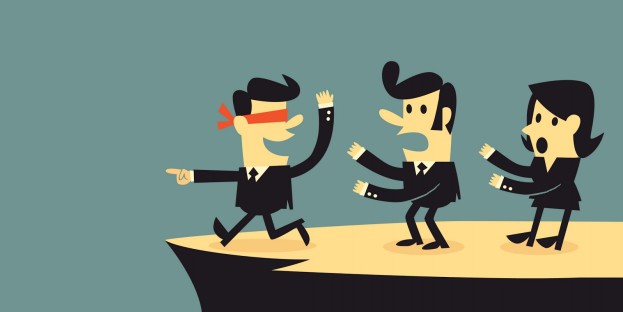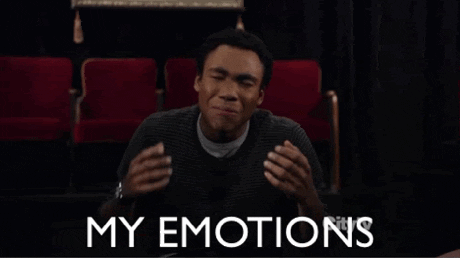
Research reveals that adults make an average of 122 informed decisions every day. Most of them are inconsequential, but many of our decisions have severe and far-reaching consequences, which require a robust decision-making skill set. A significant part involves not making bad decisions. Learn eight causes behind why we make bad decisions and how to prevent them from impacting your judgment. (Estimated reading time: 12 minutes)
“A decision made from fear is always the wrong decision.”
— Tony Robbins
Decisions, decisions, decisions…we make several every day, either consciously or unconsciously.
Should I work out in the morning or sleep longer? Is moving to another city halfway around the world a good idea, or should I stay in my hometown, which is familiar? Should I get another college degree?
Or perhaps you’re waiting in line at Starbucks and wondering if you should indulge in a caramel Frappuccino topped with whipped cream or stick with your regular green tea?
Depending on your decision-making muscles and how much is at stake, you may find yourself agonizing about your next move, fearing you will make bad decisions.
The truth is that we’re tired of the mountain of choices we must make. Research reveals that adults make an average of 122 informed decisions every day. Most of them are inconsequential, like what to eat for lunch, while some are automatic, like what to wear to the office.
But many of our decisions have severe and far-reaching consequences, requiring careful thought. Think about a significant decision that changed your life, like deciding to have a baby or leaving the corporate world to start your own business, and you’ll see how much your destiny was shaped by taking the step.
The impact of a decision can also be cumulative. For instance, the habits you build will gradually reveal their impact when they reach a tipping point. Bad habits like eating junk food every day will worsen your health. Neglecting your partner will cause a disconnect between you.
Decision-making should not be daunting – it should empower us. Decision-making is a powerful privilege when exercised wisely. Especially as women, many of our ancestors had decisions made for them.
Navigating the minefield of decisions is a skill set we must develop to succeed. It’s arguably one of the most critical abilities because of its global effect. A significant part involves knowing why we make bad decisions and what could potentially trip us.
Like a player in the game of snakes and ladders, we become cognizant of the snakes that make us slip and stumble down and the ladders that help us grow and ascend.
Is there such a thing as a “bad decision”?

Before we understand how to avoid making a bad decision, we must understand what it means.
The idea of something being ‘bad’ is subjective. When viewed through a wider lens of time, what appears to be a bad decision at first can turn out to be good later in your life.
A popular saying tells us there is no such thing as a bad decision because every decision plays a pivotal role in our personal growth and evolution. If you make a good decision, all is well. But if you make a bad decision, you learn from it, if you’re willing.
Dr. Phil McGraw articulated this truth when he said, “If you learn from your mistakes, it’s tuition. If you don’t, you have just paid a penalty.”
The other issue with the ‘good’ and ‘bad’ classification of decisions is that each has benefits and costs. While these can often be subtle, beneath the surface, and therefore not immediately apparent, you can be sure there will be a trade-off in some capacity.
For instance, buying a lavish home in an upscale neighborhood while on a tight budget might impress people and make you feel accomplished, but you’ll have to cut back on other luxuries, like traveling, to pay off your mortgage.
What this illustrates is that everything in life requires some form of sacrifice. We must give up on other available options to reap the benefits of committing to one decision. As the saying goes, “There’s no such thing as a free lunch.”
Our aim should be to make decisions that maximize our chances of getting what we want.
How do you know if you’re getting what you want from your decisions? It depends on your values and goals. That’s why what seems like a good decision for you might be a terrible one for someone who wants different things.
The good news is that you’re in the driver’s seat. You decide what’s ‘good’ or ‘bad’ because it’s exclusive to your preferences and outlook. The not-so-good news? You must do the work to create your own yardstick to measure the options in your life.
This will help you narrow in on what is good for you, what isn’t, and help you decide what trade-offs you’re willing to make. Everything will involve an element of struggle, and you must get clear on what you’re willing to tolerate. You should be convinced that it’s worth it because you deeply value what you will gain from doing it.
Is having and raising children worth the time, effort, and emotions for the rest of your life? Is becoming a freelancer worth living on a fluctuating, variable income, and the stress of filling your sales pipeline? This might seem unpleasant, but remember that the more you’re willing to do that most people aren’t, the higher your competitive advantage.
Do bad decisions exist? Yes, they do – and it comes down to your definition. Anything that moves you further from what you want and costs you more than you’re willing to invest is a ‘bad decision.’ If you’ve made them in the past, take note of the lessons and use them to improve.
Why we make bad decisions

When you look back on your life, you may wonder why you made certain decisions, particularly the ones that didn’t turn out as you’d hoped. While you may still make bad decisions, understanding the cause of irrational decision-making can drastically reduce them.
Several factors contribute to bad decisions. Understanding the process will give you the insight to make informed decisions in the future.
1. Bad mental models
Our minds like to use cognitive shortcuts to process new information in shorter spans of time. One way this is accomplished is through mental models; abstract representations of reality that make it easier for us to problem-solve and understand complex information.
Bad decisions occur when we use the wrong mental models for a specific task or don’t use models at all and make decisions haphazardly. Not knowing how to use mental models correctly can lead to poor choices because we fail to consider all factors and how they interact to create the final outcome.
How to overcome it:
Examine your mental models and eliminate or replace them with ones to help you make better decisions. Understand the different types of models you can use, their application to a problem, and develop your mental model toolbox like subject-specific models. Examples may include a risk-vs-reward model in mathematics or generic ones like a cognitive, intuitive, creative, and recognition-primed decision model. Each model is suitable for different scenarios based on time and other factors.
2. Mental shortcuts and cognitive bias
Psychological blind spots can lead us to make bad decisions. Besides the unconscious beliefs derived from a faulty model of the world, there are generic ways of thinking, known as ‘heuristics,’ which cause psychological blind spots that can skew reality, lead to bias, and distort reality.
Heuristics is a psychological term that describes the mental shortcuts people use to make decisions or judgments. This usually involves focusing on one aspect of a complicated issue to the exclusion of others.
Under most circumstances, this is an elegantly efficient way of handling complex situations and data, but it can sometimes lead to cognitive biases and inaccurate assessments outside our awareness.
How to overcome it:
Avoid the mental traps caused by your blind spots by familiarizing yourself with the various biases humans can be influenced by and learning how to minimize their effects. It also helps to get the opinions of other people who might be affected by biases you have and can take a more objective stance in the decision-making process.
3. Decision fatigue
We must deal with a continuous stream of choices from the moment we wake up. Some are minor, like what to make for breakfast, while others are more difficult, like choosing where to live. With the right mindset and attitude, the avalanche of decisions we make each day can be manageable. Our ability to make decisions wears thin. The term used to describe this mental overload is decision fatigue.
How to overcome it:
Streamline your tasks and eliminate, delegate, or postpone those that are less important and can wait. Prioritize weightier decisions by making them earlier in the day or whenever your energy levels are highest.
4. Lack of focus
Being unable to focus and access deep thinking significantly hinders making sound decisions. There are several reasons why we lack focus:
- Distractions: We live in an era full of distractions where communication and information never cease. Research shows that our brains process five times as much information today as in 1986.
- Multitasking: Trying to juggle several tasks increases your cognitive load and negatively impacts how effectively you can focus on one key aspect of a decision and processing information.
- Indecision: Indecisiveness can occur if we are afraid of making the wrong decision or feel that we’re not capable of choosing the right path. We might even be stuck in analysis paralysis because of the abundance of choices and information we must consider. Stalling our decisions can be detrimental to the result.
How to overcome it:
To counter distractions, schedule time to unplug and step back from news, social media, email, and your smartphone. Doing this will give you more time, energy, and mental bandwidth to focus. When you need to make important decisions, create blocks of time during the day to focus solely on that task.
While the decision-making process should be well-thought-through, the best way to make good decisions isn’t to take less time or look at more information. Instead, review the pertinent information you need, set a deadline to decide, and then stick to it.
5. Limited perspective
Often, we get stuck in our own worldviews, we fail to see that our perspective is only one vantage point, limiting our perception of reality. We may miss elements critical to our decisions through this narrow window. We may have insufficient (or more accurate) information, data, and feedback from others to support our existing ideas, which will inevitably lead to lower-quality decisions.
How to overcome it:
The best way to get over a limited perspective is to be open to learning and gathering information to aid you in your decisions. Get comfortable receiving constructive feedback and listening to others, even if it does not reflect your views.
Seek experts, evaluate multiple perspectives, and give yourself ample time to examine and consider your choices. Ensure that the information and data you use are credible and trustworthy, and make good observations.
6. Emotions

Emotions are a fundamental part of human existence, but when it comes to decision-making, they are a double-edged sword. They can offer valuable information if we channel them correctly, but they can distort our thinking if we can’t. Anger, frustration, and joy can fog our minds.
If you think back to some of the bad decisions you’ve made, chances are most of them were made when you were overwhelmed by what you felt at that time. Maybe you sent an angry text to a friend you later regretted, or your excitement in the first stages of love made you oblivious to the red flags displayed by a dysfunctional partner.
Our emotions overtake our sense of reality because they operate separately from our thoughts. They are driven by the animalistic instincts that rule our desires and cravings. A disciplined thinking mind is objective, patient, calculated, and watchful. But our emotions tend to be stronger than our thoughts, so it takes conscious effort to balance them.
How to overcome it:
To counter a flood of emotions, resist the temptation to react and decide your next steps until you are back on a balanced and even keel. Walk away, get some distance, take time to sit with yourself, and use emotional management techniques such as deep breathing before responding.
Once you feel centered, figure out what your emotions are trying to tell you and if you need to factor that into your reasoning so that you can honor them. Speaking with a therapist or journaling could give you a better perspective on what you’re feeling.
7. Focusing only on the present and not considering the consequences
A myopic attitude towards decisions can skew our judgment. Some people get so excited about the immediate gratification and benefits of making a decision that they fail to consider the consequences.
Quick decisions without evaluating the side effects and long-term ramifications are detrimental to our success and wellbeing. This is especially true if we’re dealing with complex and significant choices.
For instance, leaving a stressful job may relieve you temporarily, but it will cause additional stress if you don’t have an emergency fund or other sources of income to keep you afloat.
How to overcome it:
To avoid errors from hasty decisions, schedule enough time to think about them. Create lists of pros, cons, and future scenarios that could play out when taking a particular path.
Can you manage if things don’t go as well as you hoped? What are other side effects that could result from your decision? Step out of the box of the immediate outcomes and think about the unintended consequences.
8. The need for social approval and validation
As social creatures, we are conscious of how others perceive us and our actions. While someone’s opinions can steer us in a positive direction, the wrong person could steer us in an unfavorable direction.
It’s easy to be swayed and lose sight of our needs when we’re in the presence of someone with socially desirable qualities such as wealth, beauty, and power, or to whom we’re attached.
If we have high self-worth and are tuned into our inner counsel, we’ll have a strong sense of what’s suitable for us, and we will be able to take other people’s ideas with a grain of salt and not let them override our judgments. But if we’re needy of others’ validation, we might let their view override our own. Whether it’s a pushy boss or a manipulative partner, choosing to nod in agreement, even if you disagree, can lead to harmful or disastrous decisions.
How to overcome it:
If you depend on other people’s validation and approval, focus on building your self-esteem and getting clarity about your values and goals. With this solid inner foundation, you are better positioned to evaluate collective opinions and remain the primary owner of a decision. Take yourself from the social context and ask yourself how you would handle it if others were not around. By doing this, you won’t need approval or give in to peer pressure.
The best decisions you can make come from a place of peace, authenticity, and awareness. Whether the outcomes match your expectations, you can be sure it will eventually direct you to where you’re meant to be. When led by the voice of our Higher and Wiser Selves, the purest and most honest parts of us, we can be sure we’re heading in the right direction.
All my best on your journey,
Seline

Questions for you: What is the leading cause of your bad decisions? What can you learn from it to avoid being swayed in the wrong direction?
Did you like this post? Sign up below, and I’ll send you more awesome posts like this every week.

I’ve not finished reading it all yet – but it’s extremely insightful and very in line with our research into self-efficacy and safety.
Bad decisions are a part of life I think- they are a learning opportunity. Yes we need to try and avoid them and be smart with our actions and choices., But bad choices and mistakes can be a good thing at times in the long run. I think that is something to also keep in mind!